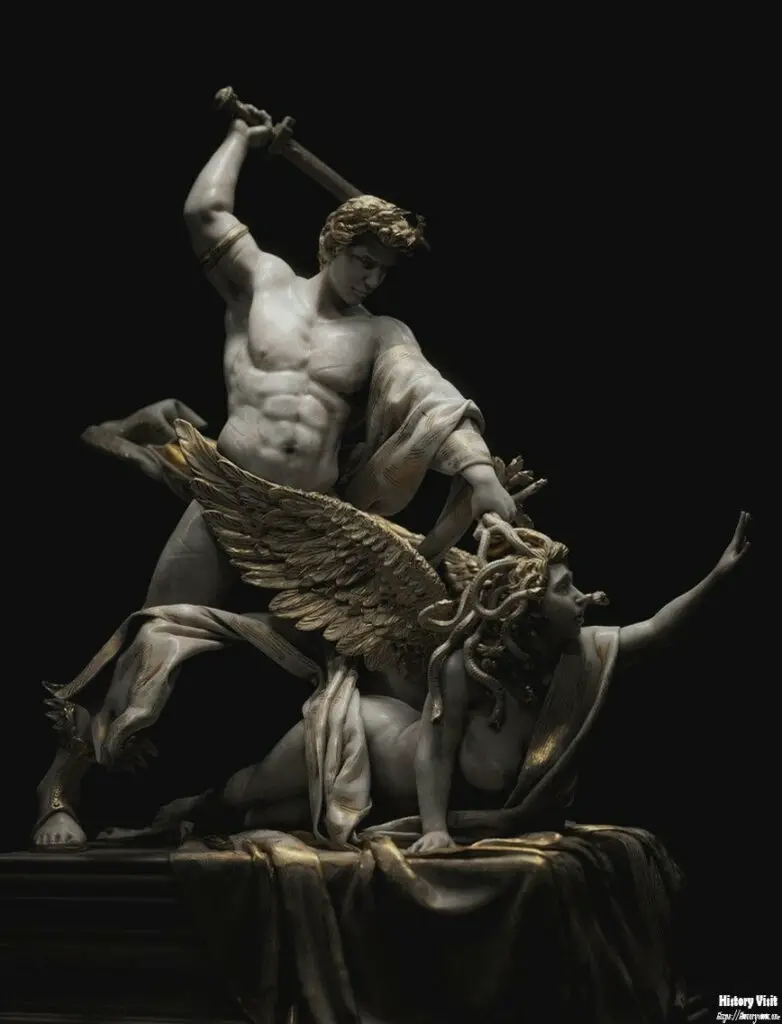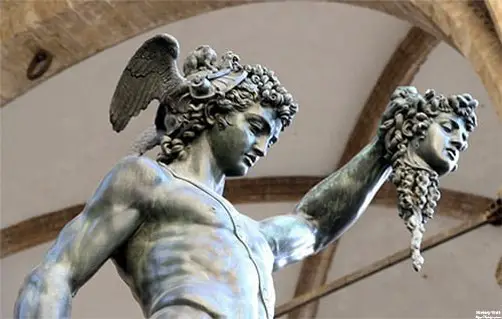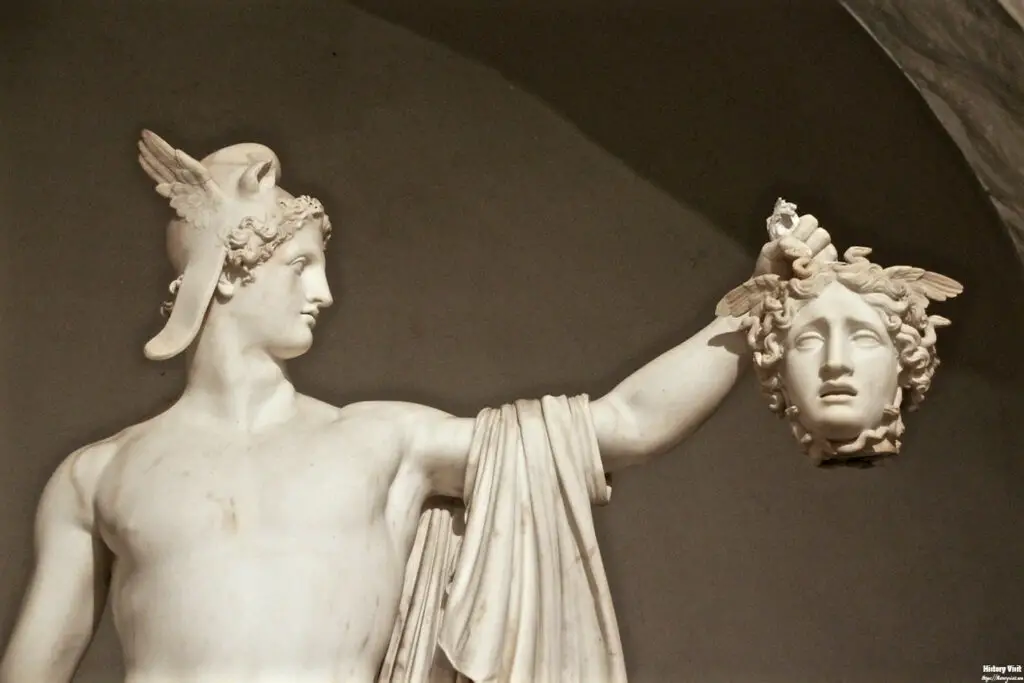Perseus and Medusa: The Heroic Tale of Defeating the Gorgon

Introduction
The myth of Perseus and Medusa stands as one of the most captivating tales in Greek mythology. It weaves together themes of prophecy, divine intervention, bravery, and the eternal struggle between good and evil. Perseus, one of the most celebrated heroes of Greek mythology, embarks on an epic quest that showcases his strength, courage, and ingenuity. At the heart of this story lies Medusa, a fearsome Gorgon whose gaze could turn anyone to stone. The confrontation between Perseus and Medusa is not merely a battle of strength but a clash of fate and destiny, making it a timeless tale that has fascinated generations.
The myth begins with the origins of Perseus, a hero born under extraordinary circumstances and destined for greatness. His birth, marked by divine intervention and mortal treachery, sets the stage for an adventurous life filled with challenges and heroic deeds. Perseus’ journey is a testament to his resilience and the favor of the gods, who equip him with the tools and guidance necessary to overcome seemingly insurmountable obstacles.
As we delve into the story of Perseus and Medusa, we explore the intricate layers of Greek mythology that underpin this epic saga. From the prophecy that foretold Perseus’ birth to the divine gifts that aided him in his quest, every element of this myth contributes to its enduring appeal. Join us as we unravel the origins of Perseus, his daring quest to defeat Medusa, and the lasting legacy of his heroic deeds.
The Origins of Perseus
Birth and Early Life
The story of Perseus begins with a prophecy that foretold great upheaval. Acrisius, the king of Argos, learned from an oracle that his daughter Danaë would bear a son who would one day kill him. Fearing for his life, Acrisius took drastic measures to prevent this prophecy from coming true. He imprisoned Danaë in a bronze chamber, hoping to keep her isolated from any potential suitors. However, the gods had other plans. Zeus, the king of the gods, visited Danaë in the form of a golden shower, and she became pregnant with Perseus.
Perseus’ birth was both miraculous and perilous. Upon discovering the infant, Acrisius was horrified but unwilling to risk the wrath of the gods by killing them directly. Instead, he placed Danaë and her newborn son in a wooden chest and cast them into the sea, leaving their fate to the elements. The chest drifted to the island of Seriphos, where it was discovered by a kind fisherman named Dictys. Dictys took Danaë and Perseus into his home, raising the boy as his own.
The Chest at Sea
The journey of Danaë and Perseus across the sea in a chest is a striking image in Greek mythology. It symbolizes their vulnerability and the whims of fate that govern their lives. Despite the perilous circumstances, they were protected by divine intervention. The chest’s safe arrival on Seriphos marked the beginning of a new chapter for Perseus, who grew up in a humble but loving environment, far from the machinations of his grandfather Acrisius.
Under the care of Dictys, Perseus thrived. He became known for his strength, intelligence, and noble character. However, their peaceful life was soon disrupted by the ambitions of King Polydectes, Dictys’ brother. Polydectes became enamored with Danaë and sought to marry her, despite her clear disinterest. To eliminate Perseus, whom he saw as an obstacle, Polydectes devised a cunning plan that would set the stage for Perseus’ legendary quest.
Call to Adventure
Polydectes announced that he intended to marry Hippodamia, a ploy to gather gifts from his subjects. When Perseus, who had no wealth, expressed his inability to provide a suitable gift, Polydectes seized the opportunity to rid himself of the young hero. He demanded that Perseus bring him the head of Medusa, one of the three Gorgons, whose gaze could turn anyone to stone. This task, seemingly impossible, was a cunning ploy to send Perseus to his doom. Undeterred, Perseus accepted the challenge, setting out on a journey that would define his legacy in Greek mythology.
The Quest for Medusa
Divine Assistance
Perseus’ quest to defeat Medusa was fraught with danger, but he was not alone. The gods of Greek mythology, recognizing his bravery and noble heart, provided him with crucial assistance. Hermes, the messenger god, gifted Perseus with winged sandals, enabling him to fly. Athena, the goddess of wisdom and warfare, gave him a reflective shield that would protect him from Medusa’s deadly gaze. Additionally, Hades, the god of the underworld, lent Perseus his helm of darkness, granting him the power of invisibility.
These divine gifts were not merely tools; they were symbols of the gods’ favor and a testament to Perseus’ worthiness. Armed with the winged sandals, the reflective shield, and the helm of darkness, Perseus set out on his perilous journey. He also received a kibisis, a special sack to safely carry Medusa’s head, and an adamantine sword capable of decapitating the fearsome Gorgon. These gifts highlighted the importance of divine intervention in Greek mythology and underscored the theme of destiny guiding the hero’s path.
Journey to the Gorgons’ Lair
The journey to find Medusa was long and arduous. Perseus first sought out the Graeae, three ancient sisters who shared a single eye and tooth. These sisters held the secret to locating the Gorgons’ lair. Perseus, using his cunning, managed to seize their shared eye and tooth, forcing them to divulge the necessary information. With the knowledge gained from the Graeae, Perseus continued his journey, flying over vast lands and treacherous waters, driven by the determination to fulfill his quest.
As Perseus approached the Gorgons’ lair, he encountered numerous challenges that tested his resolve and resourcefulness. The lair itself was a desolate place, filled with the petrified remains of those who had fallen victim to Medusa’s gaze. Perseus knew that a direct confrontation would be fatal, so he devised a clever strategy to defeat Medusa without looking directly at her. The reflective shield provided by Athena would prove to be his most valuable asset in this deadly encounter.
The Battle with Medusa

Medusa, once a beautiful maiden cursed by Athena, had been transformed into a monstrous Gorgon with snakes for hair and a gaze that could turn anyone to stone. Perseus approached her lair with caution, using the shield’s reflection to navigate his way. By avoiding direct eye contact, he managed to get close enough to Medusa to strike. With a swift and decisive blow from his adamantine sword, Perseus decapitated Medusa, claiming her head as his prize.
The battle with Medusa was not just a physical confrontation but a test of Perseus’ bravery and ingenuity. His victory over Medusa demonstrated his ability to think strategically and use the tools provided by the gods effectively. As Medusa’s head was severed, two mythical creatures emerged from her body: Pegasus, the winged horse, and Chrysaor, a giant wielding a golden sword. Perseus carefully placed Medusa’s head in the kibisis, ensuring it would not harm him or anyone else during his journey back.
Aftermath and Legacy
Encounters on the Way Home
With Medusa’s head safely in his possession, Perseus began his journey back to Seriphos. Along the way, he encountered numerous adventures and challenges that further solidified his status as a hero in Greek mythology. One of the most notable events was his rescue of Andromeda, a beautiful princess who had been chained to a rock as a sacrifice to the sea monster Cetus. Perseus, flying on Hermes’ winged sandals, descended upon the scene and swiftly defeated the monster, saving Andromeda and winning her hand in marriage.
The wedding of Perseus and Andromeda was a joyous occasion, but it was not without conflict. Andromeda had been previously betrothed to another suitor, Phineus, who attempted to disrupt the wedding. Perseus, using Medusa’s head, turned Phineus and his followers to stone, ensuring that no one would challenge his rightful claim to Andromeda. This episode highlighted Perseus’ resourcefulness and his willingness to protect those he loved.
Return to Seriphos
Upon returning to Seriphos, Perseus found that his mother, Danaë, was being harassed by King Polydectes, who had not abandoned his desire to marry her. Perseus confronted Polydectes and his court, revealing Medusa’s head and turning them all to stone. This act of retribution freed Danaë and allowed Dictys to ascend to the throne, ensuring a just and peaceful rule over Seriphos. Perseus’ actions demonstrated his commitment to justice and his willingness to stand up against tyranny.
With his mission complete, Perseus returned the divine gifts to the gods, expressing his gratitude for their assistance. He and Andromeda settled down and had a family, establishing a legacy that would endure for generations. Perseus’ heroic deeds and the favor of the gods cemented his place in Greek mythology as one of the greatest heroes of all time.
Fulfilling the Prophecy
Despite his many achievements, Perseus could not escape the prophecy that had shaped his life. Returning to Argos, he sought to reconcile with his grandfather, Acrisius. However, fate intervened during an athletic competition where Perseus, unknowingly, struck Acrisius with a discus, fulfilling the prophecy that he would cause his grandfather’s death. Overwhelmed
with grief, Perseus left Argos and founded the city of Mycenae, where he and Andromeda ruled until their deaths.
Perseus’ life story is a poignant reminder of the power of destiny in Greek mythology. His accidental fulfillment of the prophecy highlights the inevitability of fate and the complexities of human existence. Despite his best efforts to avoid causing harm, Perseus’ actions ultimately led to the realization of the oracle’s prediction, underscoring the inescapable nature of destiny.
Conclusion

The myth of Perseus and Medusa is a rich tapestry of heroism, divine intervention, and the complexities of fate. Perseus’ journey from his miraculous birth to his eventual fulfillment of the prophecy encapsulates the essence of Greek mythology, where gods and mortals interact in a world governed by destiny and divine will. The story of Perseus and Medusa, with its dramatic battles and enduring themes, continues to captivate and inspire audiences, reminding us of the timeless power of myth.
Perseus’ triumph over Medusa and his subsequent adventures highlight his bravery, resourcefulness, and unwavering commitment to justice. His encounters with divine beings and mythical creatures add depth to his character, illustrating the close relationship between mortals and gods in Greek mythology. Through his deeds, Perseus not only secured his place in the pantheon of heroes but also left a lasting legacy that would influence generations to come.
As we reflect on the tale of Perseus and Medusa, we are reminded of the enduring power of stories to convey profound truths about the human condition. The myth’s exploration of themes such as destiny, courage, and the struggle between good and evil resonates across time, offering valuable insights into our own lives. In celebrating the heroism of Perseus and the intricate world of Greek mythology, we honor the timeless tradition of storytelling that continues to shape our understanding of the world.


